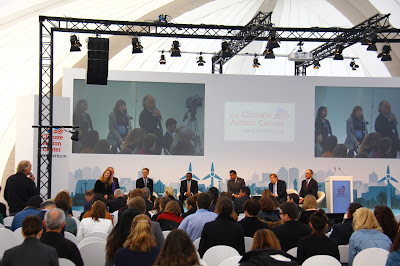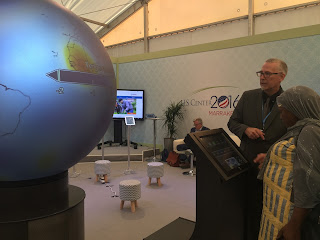On Equity at COP23
Cindy Isenhour
Assistant Professor, Department of Anthropology/Climate Change Institute
 Not unlike past meetings of the Conference of Parties (COP), issues related to equity continue to loom large in Bonn. While the substance and terminology have shifted over time (from discussions about "common but differentiated responsibilities" to recent attention to "loss and damages"), the division between the interests of developed and developing countries seems to have, sadly, remained constant.
Not unlike past meetings of the Conference of Parties (COP), issues related to equity continue to loom large in Bonn. While the substance and terminology have shifted over time (from discussions about "common but differentiated responsibilities" to recent attention to "loss and damages"), the division between the interests of developed and developing countries seems to have, sadly, remained constant.
At COP23 I'll be following two articles of the Paris Agreement with particular relevance for my ongoing research, Article 6 and Article 14. Both of these articles constituted major achievements of the Paris Agreement.
I'm particularly interested in both because they have the potential to incorporate discussions about the emissions associated with international trade (trade-embodied or consumption-based emissions). While trade embedded emissions constitute a growing share of global GHG pollution, discussions about trade and consumption-based approaches have been virtually non-existant in official negotiations. Despite this, many scientists - myself included, have noted the potential for the incorporation of these approaches to provide a more scientifically-grounded approach to the determination of equitable contributions (see previous publications on this topic, Isenhour & Feng 2016, Isenhour 2012)
Article 6 calls for mechanisms for voluntary international cooperation intended to improve both mitigation and sustainable development development outcomes. Like previous mechanisms designed to allow for the transfer of mitigation credit (e.g. the Clean Development Mechanism or CDM), there is significant opportunity to contribute to both sustainable development and mitigation - but the devil is in the details as we found out today. After two stalled talks that got hung up on procedural issues and Saudi Arabia's refusal to continue consideration of draft informal documents (on procedural grounds) the meeting went into a closed session. So, we'll have to wait until tomorrow to find out what happened!
Article 14 mandates a Global Stocktake (GST) or a process for the global community to check in on progress every five years. Moving beyond national level assessments, this global mechanism takes an important step toward helping Parties to conceptualize their contributions and achievements relative to global trends (and global trade). In this article there is also significant potential for Parties to integrate trade embedded emissions into discussions. In other words, instead of assigning the responsibility for emissions to the country where they were released (the current state of affairs and one that many developing nations think is unfair), perhaps the Parties could also consider which nations benefitted from those emissions through imports? Today I had the opportunity to sit in on the negotiations as part of the RINGO (Research and International Non Governmental Organizations) delegation. In my job as a note taker for the group, it was hard not to notice how many times the Parties made reference to the need to ensure equity in process and outcomes. These discussions are still ongoing but the beauty of the blog is that you can follow along. For a copy of my notes (should be posted by RINGO soon) and all those taken by RINGO members on all agenda items this week, please visit the RINGO notes pages.
Assistant Professor, Department of Anthropology/Climate Change Institute
 Not unlike past meetings of the Conference of Parties (COP), issues related to equity continue to loom large in Bonn. While the substance and terminology have shifted over time (from discussions about "common but differentiated responsibilities" to recent attention to "loss and damages"), the division between the interests of developed and developing countries seems to have, sadly, remained constant.
Not unlike past meetings of the Conference of Parties (COP), issues related to equity continue to loom large in Bonn. While the substance and terminology have shifted over time (from discussions about "common but differentiated responsibilities" to recent attention to "loss and damages"), the division between the interests of developed and developing countries seems to have, sadly, remained constant.At COP23 I'll be following two articles of the Paris Agreement with particular relevance for my ongoing research, Article 6 and Article 14. Both of these articles constituted major achievements of the Paris Agreement.
I'm particularly interested in both because they have the potential to incorporate discussions about the emissions associated with international trade (trade-embodied or consumption-based emissions). While trade embedded emissions constitute a growing share of global GHG pollution, discussions about trade and consumption-based approaches have been virtually non-existant in official negotiations. Despite this, many scientists - myself included, have noted the potential for the incorporation of these approaches to provide a more scientifically-grounded approach to the determination of equitable contributions (see previous publications on this topic, Isenhour & Feng 2016, Isenhour 2012)
Article 6 calls for mechanisms for voluntary international cooperation intended to improve both mitigation and sustainable development development outcomes. Like previous mechanisms designed to allow for the transfer of mitigation credit (e.g. the Clean Development Mechanism or CDM), there is significant opportunity to contribute to both sustainable development and mitigation - but the devil is in the details as we found out today. After two stalled talks that got hung up on procedural issues and Saudi Arabia's refusal to continue consideration of draft informal documents (on procedural grounds) the meeting went into a closed session. So, we'll have to wait until tomorrow to find out what happened!
Article 14 mandates a Global Stocktake (GST) or a process for the global community to check in on progress every five years. Moving beyond national level assessments, this global mechanism takes an important step toward helping Parties to conceptualize their contributions and achievements relative to global trends (and global trade). In this article there is also significant potential for Parties to integrate trade embedded emissions into discussions. In other words, instead of assigning the responsibility for emissions to the country where they were released (the current state of affairs and one that many developing nations think is unfair), perhaps the Parties could also consider which nations benefitted from those emissions through imports? Today I had the opportunity to sit in on the negotiations as part of the RINGO (Research and International Non Governmental Organizations) delegation. In my job as a note taker for the group, it was hard not to notice how many times the Parties made reference to the need to ensure equity in process and outcomes. These discussions are still ongoing but the beauty of the blog is that you can follow along. For a copy of my notes (should be posted by RINGO soon) and all those taken by RINGO members on all agenda items this week, please visit the RINGO notes pages.



Comments
Post a Comment